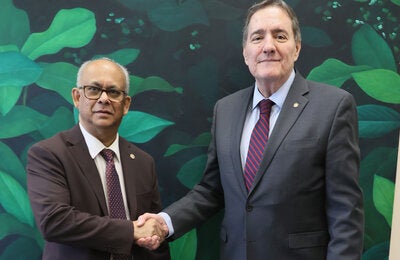

The new law bans smoking in enclosed, public, and work places, and requires health warnings to cover 75% of the main surfaces of cigarette packets, making Jamaica the fourth country in the Caribbean community to become 100% smoke-free.
Kingston, Jamaica, July 17, 2013 (PAHO/WHO).- The Pan American Health Organization/World Health Organization (PAHO/WHO) is celebrating the entry into force of new tobacco control regulations in Jamaica on July 15. These regulations will protect the population from the harmful effects of tobacco and exposure to second-hand smoke.
The new law includes a ban on smoking in enclosed, public, and work places, and requires health warnings to cover 75% of the main surfaces of cigarette packets.
"These measures will help to reduce the number of children who start smoking and will increase the number of smokers who quit," said Margareta Sköld, PAHO/WHO representative in Jamaica, who added that health warnings help to raise public awareness of the risks of smoking.
This law makes Jamaica the fourth country in the Caribbean community (CARICOM) to become 100% smoke-free, after Trinidad and Tobago, Barbados, and Suriname. It is the seventeenth country in the Americas to take this step.
"Laws against tobacco smoke protect the health of non-smokers, do not harm business, and encourage smokers to quit," said the PAHO/WHO regional adviser on tobacco, Adriana Blanco.
Blanco also pointed out that Jamaica is among the three countries in the Region with the biggest health warnings, showing images of the diseases and suffering caused by tobacco use. In Uruguay, these warnings cover 80% of the main surface area of cigarette packets, and in Canada, 75%.
{slideshow}211,478,194,n}{/slideshow}
Tobacco is one of the biggest threats to public health. It kills close to six million people a year in the world. Of these, over five million consume it or have consumed it, while more than 600,000 are non-smokers exposed to second-hand smoke. Up to half of tobacco users will die of a tobacco-related disease.
WHO is committed to supporting the global struggle against tobacco use. The WHO Framework Convention for Tobacco Control took effect in February 2005. Since then, it has become of the most widely adopted treaties in United Nations history, signed by over 170 members representing 87% of the world's population.
PAHO, founded in 1902, is the oldest international public health organization in the world. It works with its member countries to improve the health and the quality of life of the people of the Americas. It also serves as the Regional Office for the Americas of WHO.



